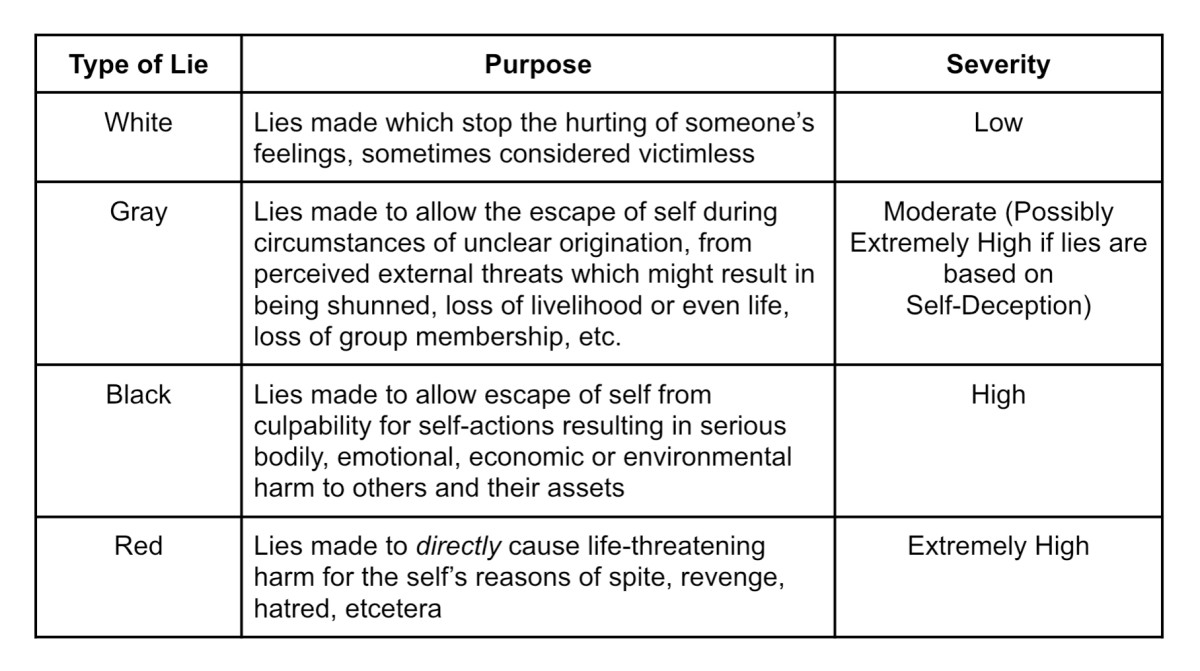How Honest Are You?
Does the Truth Hurt?
Most children are taught to tell the truth. They are given reasons why lying is a "bad" thing. Then, their parents provide a direct contradiction to this parental maxim by lying nearly every day for one reason or another. Lies are contortions of truth. Yet, more adults are unable to be truthful today than at any other time in history.
Truth By Degree
Some individuals believe in "little white lies." These are those lies that are, by degree, half truths or intended to avoid hurt feelings. There is no degree to truth. Something is true or it isn't. It's amazing how this particular fact is ignored by those who should know better. Indignation rises to epic levels when an individual is found out and is called "a liar." Unfortunately, due to a lack of respect for the critical value of honesty, looking for a "way out" or a "way around" outright lies is now an art form. To salve the egos of liars, they will say, "Well, not everything is black and white." This presupposes that lying is perfectly acceptable so long as the lies provide the desired end result.
The Liar's Cushion
Being unable to tell the truth when it is most important is like a soft, plush cushion upon which values and ethics hang in the balance. Even when testimony is sworn in courts of law, lies are still attempted. This shows the degree to which lies have been accepted. Lying under oath is referred to as "perjury." Ironically, the perjurer only destroys his/her own credibility before a jury of his/her peers. For many liars, resting upon the cushion of fabrications of truth has become the strategic methodology for which gaining leverage depends.
Lies, Liars and Lying
The problem with distorting the truth is that the distortions can always be proven. In Shakespeare's "Merchant of Venice," for example, Lancelot Gobbo states: "My conscience says 'No; take heed,' honest Launcelot; take heed, honest Gobbo, or, as aforesaid, 'honest
Launcelot Gobbo; do not run; scorn running with thy heels." The problem with lies is that they can not be proven beyond a doubt. The problem with liars is their inability to remember lies they've told. Thus, lying repetitiously about serious issues often is a game of justifying contortions of truth and entreaties to believe newly created lies to validate past lies. Most liars find all they need do when they've forgotten the original lie is to deny what has been heard. Since most individuals do not record every word spoken, the idea of pathological liars, as their last resort to cover up, is to persuade their victim that they are losing their minds.
"Truth will come to light; murder cannot be hid long; a man's son
may, but at the length truth will out." (Shakespeare's Merchant of Venice)
The undeniable fact is that truth always comes out. It may need time to ferment. As Shakespeare wrote, "at length truth will out." Liars rely on the hope that their lies will remain in memory of others for the short term. This only works if the degree of their lies do not create a "ripple" effect.
Lies, Omissions and Secrecy
In many cases, outright lies are easiest to debunk. Lies by omission, that is, remaining silent with knowledge that should provide transparency to issues are not as easy to debunk at the outset. These are the lies that need time to ferment so that the ripple effect becomes clearer. Secrecy often hides more lies by omission than most would imagine. How many families in the past hid terrible secrets about family members that should have been reported? This is practically a tradition from royalty down to the direst peasants. Today, huge businesses employ the secrecy and lying by omission strategy for the sole purpose of retaining autonomous control over employees, consumers and others who are ripples in the stream of lies.
Honesty and Truth
Those who find being honest most difficult are usually individuals incapable of personal integrity and fortitude. These are people with a highly developed sense of "self preservation at all costs." The popularity of varying degrees of honesty is more the basic operative by which the underpinnings of ethics and principles are based at present. Truth, on the other hand, has become confused with opinion. As the fiery Senator Daniel Patrick Moynihan once stated, "Everyone is entitled to his own opinion; but, not his own facts." This applies to truth as well. Truth can't be owned nor can it be changed in and of its originating existence. It is changed only by lying and distortions of truth. It would seem then that conscience plays a large role in being honest and telling the truth. Defining conscience can be a two-edged sword. On the one hand, an individual senses right from wrong. On the other hand, the individual's free will allows for the option to choose between the two. Conscience, like truth and honesty, are a matter of vision rather than illusion. The individual with the most acute vision sees through lies and distortions of truth and facts easily. The individual who relies on ego rather than conscience chooses to implement free will for good or evil.
Observe a toddler whose conscience is fresh and new. Parents have all seen the expression on a toddler's face when they've done something they know they shouldn't have. It's the sheepish look and sudden reticence to look parents in the eyes that proves every child possesses at this particular pre-school age, the most pristine sense of conscience. Adults already have experiences that adulterate their sense of conscience and force them to evaluate right from right and wrong from wrong. A child of pre-school age is often gifted with a peculiar ability to speak truthfully in ways that often strike at the very core of parental dishonesty. Many is the young child who blurts out something without realizing it was not supposed to be divulged even though it was absolutely truthful. This teaches the child that they can lie by omitting to say what they have seen or heard.
Does the Truth Hurt?
All adults know that lies are the breeding ground of massive mistrust. Once trust has been long, it is rarely ever regained. The reason for this is simple. The adult mind cannot forget. It may forgive. But, it will not erase the memory of a betrayal; nor, the sense of mistrust that betrayal and lie has spawned. Fear of being truthful has more to do with the inability to rally the emotions in a more constructive way. The idea that truth hurts often depends on the degree of the lie or the circumstances surrounding the truth. It serves no purpose to divulge truths that have yet to come to light of their own volition. The old saying, "Lest said, soonest mended" is an example of waiting for the appropriate moment to speak the truth. "Mind your own business" is another example of paying stricter attention to one's own sense of honesty before confronting others about their lies. It's always easier to pay fullest attention to one's own business than to meddle into the affairs of others when it is not necessary.
Truth That Doesn't Hurt
There are diplomatic ways of maintaining honesty and integrity when it is necessary to speak truthfully. Stick to the facts and only the facts. Do not inject any emotional minutiae into the truth. Embellishments do not add to the value of truth and emotions have a way of forcing loss of credibility.
How Honest Are You?
The simplest way to gauge your own personal sense of honesty is to review the comments and statements you make at the end of each day. Has personal interaction between family and friends been forthright and true? Have your "truths" really hurt anyone? Have you refused to divulge needed information as a form of lying by omitting to be open? In the final analysis, each individual must judge themselves and their level of honesty before judging others.








